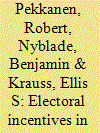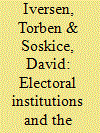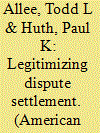|
|
|
Sort Order |
|
|
|
Items / Page
|
|
|
|
|
|
|
| Srl | Item |
| 1 |
ID:
073371


|
|
|
|
|
| Publication |
2006.
|
| Summary/Abstract |
A deliberative committee is a group of at least two individuals who first debate about what alternative to choose prior to these same individuals voting to determine the choice. We argue, first, that uncertainty about individuals' private preferences is necessary for full information sharing and, second, demonstrate in a very general setting that the condition under which unanimity can support full information revelation in debate amounts to it being common knowledge that all committee members invariably share identical preferences over the alternatives. It follows that if ever there exists an equilibrium with fully revealing debate under unanimity rule, there exists an equilibrium with fully revealing debate under any voting rule. Moreover, the converse is not true of majority rule if there is uncertainty about individuals' preferences.
|
|
|
|
|
|
|
|
|
|
|
|
|
|
|
|
| 2 |
ID:
073369


|
|
|
|
|
| Publication |
2006.
|
| Summary/Abstract |
How do electoral incentives affect legislative organization? Through an analysis of Japan's mixed-member electoral system, we demonstrate that legislative organization is strongly influenced not only by the individual legislators reelection incentives but also by their interest in their party gaining power and maintaining a strong party label. Electorally vulnerable legislators are given choice legislative positions to enhance their prospects at the polls, whereas (potential) party leaders disproportionately receive posts with greater influence on the party's overall reputation. Members of Parliament elected from proportional representation (PR) lists and in single member districts also receive different types of posts, reflecting their distinct electoral incentives. Even small variations in electoral rules can have important consequences for legislative organization. In contrast to Germany's compensatory mixed-member system, Japan's parallel system (combined with a "best loser" or "zombie" provision) generates incentives for the party to allocate posts relating to the distribution of particularistic goods to those elected in PR.
|
|
|
|
|
|
|
|
|
|
|
|
|
|
|
|
| 3 |
ID:
073368


|
|
|
|
|
| Publication |
2006.
|
| Summary/Abstract |
Standard political economy models of redistribution, notably that of Meltzer and Richard (1981), fail to account for the remarkable variance in government redistribution across democracies. We develop a general model of redistribution that explains why some democratic governments are more prone to redistribute than others. We show that the electoral system plays a key role because it shapes the nature of political parties and the composition of governing coalitions, hence redistribution. Our argument implies (1) that center-left governments dominate under PR systems, whereas center-right governments dominate under majoritarian systems; and (2) that PR systems redistribute more than majoritarian systems. We test our argument on panel data for redistribution, government partisanship, and electoral system in advanced democracies.
|
|
|
|
|
|
|
|
|
|
|
|
|
|
|
|
| 4 |
ID:
073372


|
|
|
|
|
| Publication |
2006.
|
| Summary/Abstract |
We develop and test a general argument about the conditions under which state leaders are most likely to choose legal dispute resolution over bilateral negotiations as a means to settle international disputes. Our central claim is that leaders who anticipate significant domestic audience costs for the making of voluntary, negotiated concessions are likely to seek the "political cover" of an international legal ruling. In such cases, it will be easier for leaders to justify the making of concessions if they are mandated as part of a ruling by an international court or arbitration body. We test a series of domestic-level hypotheses using a dataset comprised of nearly 1,500 rounds of talks concerning disputed territorial claims. Our multivariate analyses indicate that state leaders opt for legal dispute resolution when they are highly accountable to domestic political opposition, as well as when the dispute is highly salient to domestic audiences.
|
|
|
|
|
|
|
|
|
|
|
|
|
|
|
|
| 5 |
ID:
073370


|
|
|
|
|
| Publication |
2006.
|
| Summary/Abstract |
The health of any democratic system depends on political ambition to generate a steady supply of quality candidates for office. Because most models of candidate entry assume ambition rather than model it, previous research fails to understand its roots in individual and institutional characteristics. We develop a two-stage model of progressive behavior that distinguishes between the formation of ambition for higher office and the decision to enter a particular race. Using data from a survey of state legislators, we demonstrate that the intrinsic costs and benefits associated with running for and holding higher office shape ambitions but do not influence the decision to run. For progressively ambitious legislators, the second-stage decision is a strategic choice about when to run rather than whether to run. Our research highlights how institutional characteristics that foster progressive ambition also increase the likelihood that national or local political conditions will be translated into meaningful choices at the ballot box.
|
|
|
|
|
|
|
|
|
|
|
|
|
|
|
|
|
|
|
|
|